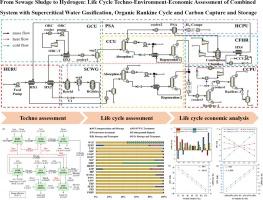从污水污泥到氢气:超临界水气化、有机朗肯循环和碳捕获与储存组合系统的生命周期技术-环境-经济评估
IF 9.9
1区 工程技术
Q1 ENERGY & FUELS
引用次数: 0
摘要
超临界水气化(SCWG)技术因其在高效处理高水分材料和生产富氢气体方面的优势而备受关注,为污水污泥(SS)处理提供了一个极具吸引力的选择。本研究开发了一种集成 SCWG、有机郎肯循环 (ORC) 和碳捕集与封存 (CCS) 技术的高效制氢系统。采用 SCWG 技术对 SS 制氢(SStH)工艺进行了全面的生命周期技术-环境-经济评估。结果表明,气化温度和水分含量是影响氢气产量和系统效率的主要因素,而气化压力的影响较小。该系统表现出良好的放能效率(30.93 %),并在总体环境影响(66.99 mPE)方面具有一定优势。电力和天然气对环境影响指标的贡献尤为突出。减少能源消耗或寻找低排放的可再生能源将进一步减少对环境的影响。SStH 的经济可行性对能源价格很敏感,天然气成本和 H2 的销售价格是关键因素。减少对天然气的依赖、提高氢气销售价格、利用碳税减免和污泥补贴等策略对于提高采用超临界水处理技术的 SStH 的经济可行性至关重要。可再生能源利用和联合气化有望进一步降低 SCWG 的运营成本。本文章由计算机程序翻译,如有差异,请以英文原文为准。

From sewage sludge to Hydrogen: Life cycle Techno-Environment-Economic assessment of combined system with supercritical water Gasification, organic Rankine cycle and carbon capture and storage
Supercritical water gasification (SCWG) technology has attracted significant attention due to its advantages in efficiently treating high-moisture materials and producing hydrogen-rich gas, offering an attractive option for sewage sludge (SS) treatment. This study develops an efficient hydrogen production system that integrates SCWG, Organic Rankine Cycle (ORC), and carbon capture and storage (CCS) technologies. A comprehensive life cycle techno-environmental-economic assessment of SS to hydrogen (SStH) process with SCWG technology is conducted. The results indicate that gasification temperature and moisture content are the primary factors affecting H2 yield and system efficiency, while gasification pressure has a minor impact. The system demonstrates favorable exergy efficiency (30.93 %) and a certain advantage in overall environmental impact (66.99 mPE). Electricity and natural gas particularly contributed to the environmental impact indicators. Reducing energy consumption or seeking alternative low-emission renewable energy sources will further reduce its environmental impact. The economic feasibility of SStH is sensitive to energy prices, with the cost of natural gas and the selling price of H2 being critical factors. Strategies such as reducing reliance on natural gas, increasing hydrogen sales prices, and leveraging carbon tax credits and sludge subsidies are vital for enhancing the economic viability of SStH with SCWG technology. Renewable energy utilization and co-gasification are expected to further reduce the operating costs of SCWG.
求助全文
通过发布文献求助,成功后即可免费获取论文全文。
去求助
来源期刊

Energy Conversion and Management
工程技术-力学
CiteScore
19.00
自引率
11.50%
发文量
1304
审稿时长
17 days
期刊介绍:
The journal Energy Conversion and Management provides a forum for publishing original contributions and comprehensive technical review articles of interdisciplinary and original research on all important energy topics.
The topics considered include energy generation, utilization, conversion, storage, transmission, conservation, management and sustainability. These topics typically involve various types of energy such as mechanical, thermal, nuclear, chemical, electromagnetic, magnetic and electric. These energy types cover all known energy resources, including renewable resources (e.g., solar, bio, hydro, wind, geothermal and ocean energy), fossil fuels and nuclear resources.
 求助内容:
求助内容: 应助结果提醒方式:
应助结果提醒方式:


